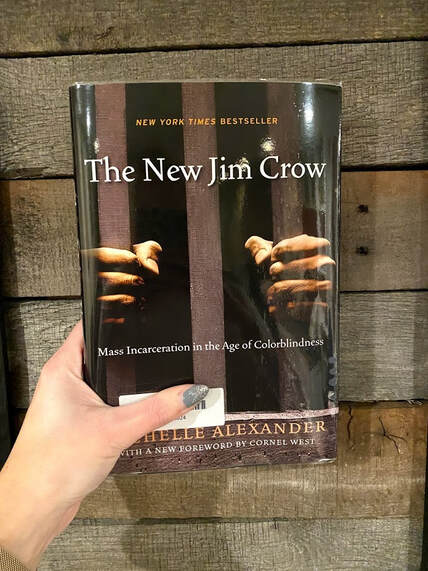|
I wish I had read this years ago, and it was a perfect complement to White Fragility by DeAngelo. I can honestly say that my understanding of issues surrounding race and racism have been dramatically altered in the last year as I've been on a quest to read more nonfiction. Although Michelle Alexander's book was published over ten years ago, it continues to be a trailblazer, clarifying history and explaining how our current social and racial structure is just another version of the Jim Crow caste system from the Reconstruction era.
Mass incarceration started as a result of a loophole in the 13th Amendment. This amendment abolished slavery except in cases where it's used as a punishment for a crime. Southern whites, angry about losing their slave labor and watching blacks become part of "their society" enacted Jim Crow laws to forcibly separate blacks from whites, preserving the best schools, jobs and neighborhoods for whites. Additionally, free blacks were arrested for committing petty crimes in alarmingly higher rates than whites. Misdemeanor offenses were elevated to felonies, and new laws were created to criminalize black life. Crimes included stealing a pig, walking beside a railroad, spitting, speaking too loudly to a woman, and selling goods after dark. These black, incarcerated men, women, and children were then leased out to private businesses as laborers. Convict leasing became a huge economic boost for the South, and it's no coincidence that arrest rates went up during cotton-picking season. A lower caste is created to keep black people from upward mobility. Michelle Alexander uses her book to point out that this lower caste system is propped up on the backs of the complex systems in place in our society. Mass incarceration is based on the label of jail and not necessarily the length of prison time. One a person is labeled a felon, they are immediately barred from ever moving up in society. Institutions in place in our country lock people of color (she focuses on black men) from being able to move from this lower caste. There are so many examples of this that I could go on forever. Some of the ones that stuck out the most to me included the traffic studies in New Jersey and Maryland. While studies showed there were actually more white people traveling on the roads, 80% of the stops were of black people, and they resulted in minimal amount of drug seizures. The Reagan-era War on Drugs has been largely ineffective in curbing drug use but highly effective at subjugating more and more black people to this undercaste system despite the fact that drug offenses are committed at roughly equal rates across races. Drunk driving rates and deaths were skyrocketing at the same time as the War on Drugs, but penalties were much higher for first-time users of crack. Statistics showed that drunk drivers were more often white males while the harsher penalties were given to black males for low-level drug offenses. Felons are not allowed on juries, can not vote, can not apply for public housing assistance, and have a nearly impossible time finding jobs. Once a person is labeled a felon, they are rarely able to better themselves. Jails were being filled up with black men during the War on Drugs, and the tough-on-crime attitude of the 80s and 90s seemed to be focused mainly on crimes committed by black people. This caste system has been perpetuated by policies created under both political parties. In the version I read, Alexander has a new Foreward that discusses this book in today's politics. She discusses Obama's record-high number of immigration detentions, Trump's tweeting of a white power supporter and calling the Charlottesville white supremacists "very fine people", Reagan's ineffective War on Drugs, and Clinton's disastrous three strikes crime bill. The Supreme Court has effectively blocked black people from legally fighting against racial bias. The ruling in the McClesky vs. Kemp case requires people to present such an impossible burden of proof with regards to racial discrimination in the justice system that it virtually makes bias and discrimination constitutionally acceptable. The layered, interlocking systems in place in our society lock poor people of color into a second class status. Alexander also points out that our nation's emphasis on colorblindness creates a racial indifference that allows these systems to stay in place, to a point where today's racial caste is no different than that of the Jim Crow era. She calls for a society where we see one another, learning and caring about our differences. When I finished reading this, I felt hopeless and sad. I can't even begin to imagine how people of color feel living with this grim reality every day. Alexander does not offer solutions in her book as she focuses mainly on research and data. I felt the need to read up on what solutions exist to combat some of the things discussed in Alexander's book. I found the Sentencing Project's Report to the United Nations on Racial Disparities in the U.S. Criminal Justice System, and they recommend the following: *Ending the War on Drugs *Eliminating mandatory minimum sentences *Reducing the use of cash bail *Fully funding indigent defense agencies *Requiring the use of racial impact statements *Implementing training to reduce racial bias *Addressing collateral consequences I highly recommend this book if you're looking for some perspective on the complex issue of race in America. As a white person, I wish this had been required reading much earlier in my life, and I will forever sing its praises.
0 Comments
Leave a Reply. |
AuthorTravel All the Pages is inspired by my two loves - travel and reading, a combo I can't resist. Enjoy these little pairings. Archives
March 2023
Categories
All
|

